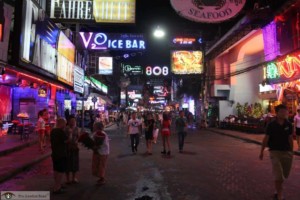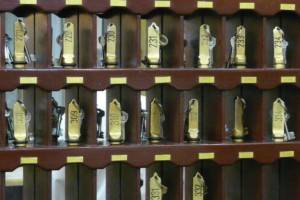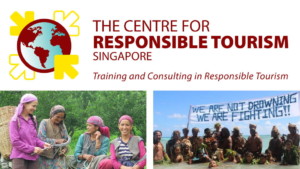Aviation, tourism can do more to stop human trafficking
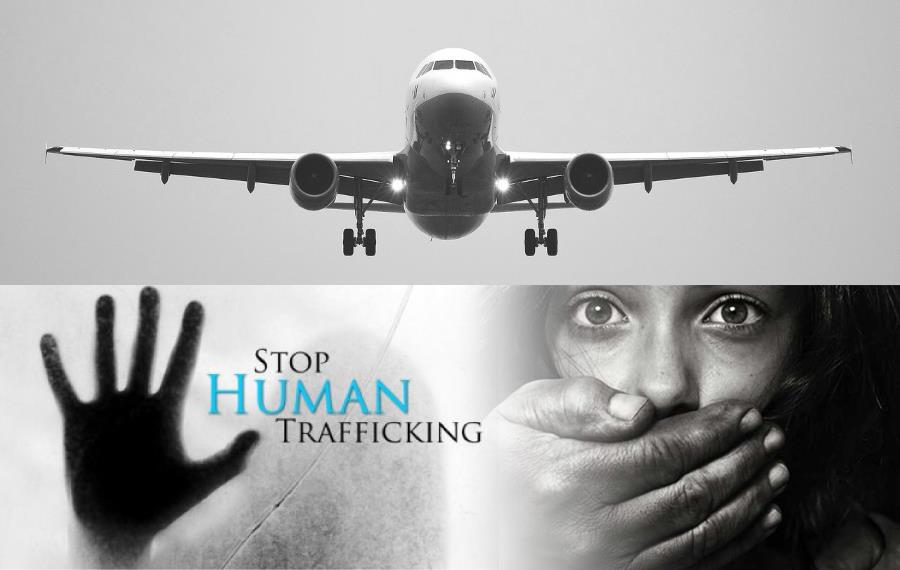
Flight attendant Donna Hubbard was deeply concerned when a couple carried a boy who was sweating, lethargic and appeared to be in pain onto her flight from Honduras to Miami in October last year.
After take-off, Hubbard and her crew spoke to the man and woman separately, who gave different names and ages for the boy. Hubbard told the Thomson Reuters Foundation she was suspicious that he was being trafficked, kidnapped or even being used as a drug mule.
The pilot alerted authorities in Miami who met the boy and his companions on arrival. While unable to reveal details, a customs official later told Hubbard that she had made the “right call” and the boy had been safely intercepted by officials.
Hubbard’s actions are the kind of intervention the United Nations Office on Drugs and Crime (UNODC) recommended last week when it urged airline bosses at an international airline summit to train flight crews to help prevent human trafficking.
Jean-Luc Lemahieu, UNODC policy director, told the International Air Transport Association (IATA) meeting: “It is not rocket science but most flight attendants spend one hour to eight hours with passengers.
“They can see the signs. It’s an invisible crime but in plain sight, you can see it if you know what to look at.”
The skies have long been on the frontlines of the fight against human trafficking as criminal gangs transport thousands of children and vulnerable people by air each year.
These victims are among almost 46 million people globally living as slaves, trafficked into exploitation, sold for sex or trapped in debt bondage, according to the 2016 Global Slavery Index.
While some training of airline staff to spot and report potential trafficking is mandatory in the United States, it is not widespread across the industry.
Campaigners say this must change. Nancy Rivard, founder of Airline Ambassadors International, a charity that trains global airline staff on trafficking, said the situation is improving slowly but much more needs to be done.
More than 70,000 U.S. airline staff have been trained to spot smugglers and their victims under the Blue Lightning initiative, launched in 2013 with the support of JetBlue, Delta Air Lines and others.
But Rivard said most airlines are “doing the very minimum against trafficking” on board their flights.
Flight attendant Hubbard, who works with Rivard’s charity, said some airlines had taken action but others were “afraid of the liability of acknowledging that (trafficking) happens on our airplanes even though they know it exists”.
Anti-trafficking group ECPAT-USA said that airlines’ work on the issue has lagged behind other travel and tourism sectors.
“While we have seen large numbers of hotels train staff and their parent companies adopt policies, we see very little movement with airlines,” Michelle Guelbart of ECPAT-USA told the Thomson Reuters Foundation.
She said Delta Air Lines was the first and remains one of only two global airlines — with Mexico’s Volaris — to join ‘The Code’, an industry initiative to boost awareness and stop child sex exploitation.
“It is shocking that so many have continued to lag behind but we hope this changes and their peers step up,” she said.
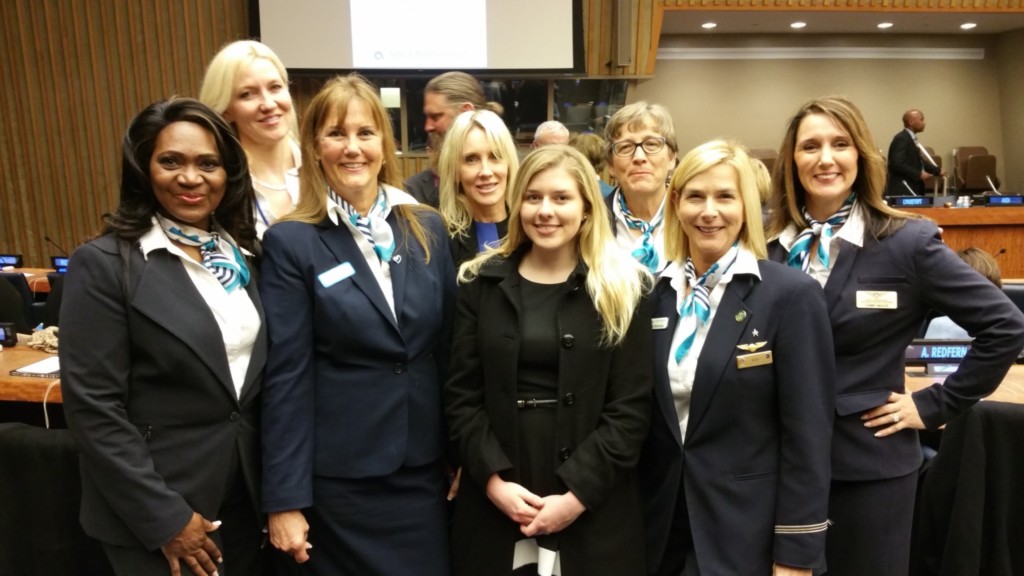
Airline Ambassadors International (AAI) members at the United Nations, including Donna Hubbard (front row, far left) and Nancy Rivard (front row, second from left) Source: AAI
Lack of training
Rivard, a former flight attendant, said her organisation trains staff to be aware of young women or children who appear to be being controlled, show signs of mistreatment or who seem frightened, ashamed or nervous.
She said flight attendants regularly start conversations with women travelling alone, such one 18-year-old on a 2015 flight from Chicago, who said she was excited to see a boyfriend she had met on Facebook but who wasn’t coming to meet her at the airport.
When staff checked the seat reservation, Rivard said, they found it had been booked by a woman in a different part of the country with the a “nefarious looking” social media profile of “love me long, love me good”.
Following further investigation, the teenager was rescued by law enforcement officials three days later, she said.
Rivard also cited a recent flight from Rome to Chicago, when staff noted a seven-year-old Albanian girl travelling with a middle-aged American man — a situation that seemed suspicious.
The crew informed the flight deck, said Rivard, but the pilot had received no training on trafficking so refused to report anything.
Rivard said attendants should not try to rescue potential victims themselves and should inform appropriate authorities. If they don’t, she said, “they’re as guilty as the traffickers”.
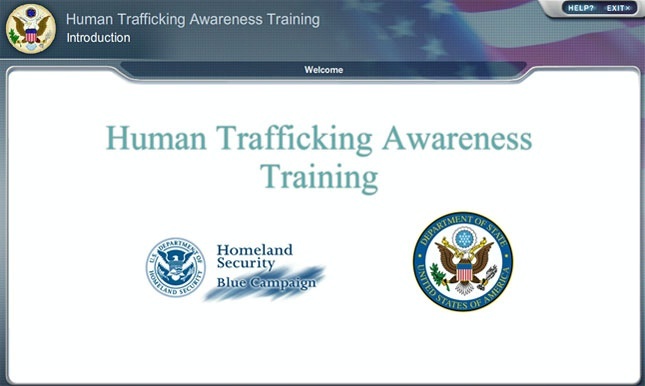
Airline Ambassadors International collaborates with the US’ Homeland Security and the State Department to train airline and travel industry personnel with Trafficking in Persons approved curricula at major airline hubs.
Growing momentum?
Hubbard said education, increasing public awareness and greater efforts by some airlines means the fight against trafficking in the air is gradually gaining momentum.
Dubai-based Emirates, the world’s largest longhaul carrier, told the Thomson Reuters Foundation it was working on a trafficking training programme for all cabin crew.
Low-cost British airline Easyjet said in March it would introduce enhanced training on trafficking for crew and ground staff over the next year.
Delta said it had trained over 54,000 employees to spot signs of trafficking and pointed to its partnership with anti-trafficking group Polaris, who map all calls to the National Human Trafficking Hotline in the United States.
American Airlines said it was committed to the fight against trafficking, used training offered by Blue Lightning and has an air mile donation programme to Airline Ambassadors International.
US airline Southwest said it gives training on trafficking to new hires and the information is widely available to existing employees.
Ryanair said all of its crew undergo rigorous training in full compliance with European Union guidelines.
Of 13 major international airlines contacted by the Thomson Reuters Foundation, seven did not respond to repeated requests for comment.
Source: Thomson Reuters Foundation, the charitable arm of Thomson Reuters.
According to the Airline Ambassadors International website, “airports and supporting travel hotels are major hubs of entry and exit for perpetrators and victims [of human trafficking]. Training is needed for airport and travel industry personnel including airport employees, hotel employees, tourism companies, ground transportation and law enforcement. [The US State Department (DOS)] supports such training, but currently does not fund it.
“Airline Ambassadors International collaborates with Homeland Security and DOS to train airline and travel industry personnel with [Trafficking in Persons (TIP)] approved curricula at major airline hubs.”
Related posts


